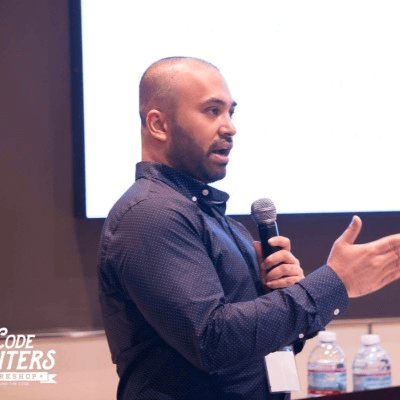ReactiveMongo | Play Framework | Kotlin | Functional Programming | Java | Swift It's Not Only About the Benjamins September 28, 2017 
Neil Chaudhuri (He/Him)
LinkedIn 

Neil Chaudhuri (He/Him)
LinkedIn ![]()
The 2017 Stack Overflow Developers Survey had the most respondents since they began the project in 2011. You really should take a look. They cover a lot of ground, and the findings across geography and demographics are fascinating.
It’s interesting most developers report feeling underpaid. That isn’t surprising to me, but it might be counterintuitive to people more accustomed to Stark Industries than to Pied Piper. It’s natural to follow up by asking which programming languages pay the most, and those answers did surprise me.
Worldwide it’s Clojure! Really? This is particularly interesting since Stack Overflow has also noted that Clojure is losing popularity among functional languages. I guess there is some combination of major investment in Clojure with a shrinking pool of capable Clojure developers that is driving up their value.
In the United States, the title for highest-paying programming language is shared by Scala and Go. Meanwhile Python, which Stack Overflow declared ”has a solid claim to being the fastest-growing major programming language,” is the highest-paid in France and India and second-highest (to Java) in Germany.
It’s great these languages pay so well, but what really matters is they are powerful languages that help us solve harder problems faster. At Vidya we have had the pleasure to work with all of them.
Clojure
Yes, even Clojure. I worked on a DARPA project called XDATA which identifies the analytics tools best suited to particular kinds of problems. One such tool was Cascalog from the mind of Nathan Marz, the creator of Apache Storm and author of the Lambda Architecture. It’s gone cold now, but at the time, Cascalog represented a powerful alternative to Map Reduce because it is built on Clojure to harness the power of functional programming to solve Big Data problems. This was my first professional exposure to functional programming after years of working with Java, and I became so enamored of the natural fit between functional programming and Big Data that I even blogged about its advantages over Java for building analytics.
It was also at XDATA that I met a brilliant team from AMPLab at Berkeley who had created a revolutionary project called Spark.
Scala
Spark was my first introduction to Scala, and I have been a huge fan of the language ever since. I marveled at how I could write complex analytics—at least for me at the time—with so little code. Since then, Spark became open-sourced as Apache Spark, and I got badges in both Scala and Apache Spark on Stack Overflow. I expanded my Scala knowledge working not only with Spark but also with Play Framework, ReactiveMongo, Scalaz, and Akka for several government and commercial clients. I have come to enjoy Scala so much that it is very hard to go back to writing Java. I even put together a tutorial on YouTube called Nine Reasons to Try Scala and have given several talks based on it.
Scala motivated the evolution of Java that began with Java 8, and Scala itself continues to evolve in disparate domains with Scala.js, Dotty, and Scala Native. The learning curve is steep, and slow compilation and esoteric documentation continue to be real problems. But Scala has made me a better engineer in every language I use by helping me embrace immutability, composability, and all the other qualities that make functional programming so powerful.
Go
I am still new to Go, but I can see why it continues to shoot up the TIOBE Index.
Google designed Go neither to be revolutionary like Smalltalk nor all things to all people like Java. Instead, it does
a few things well, and it is very fast. The canonical use case for Go is multicore programming because it provides
goroutines and channels, which abstract concurrent tasks by facilitating messages
among lightweight threads. Future in Scala does something similar, and that is also a powerful albeit
controversial abstraction. Both languages are also
statically typed but offer facilities reminiscent of dynamic typing.
As for my first professional experience with Go, you’re looking at it. I rebuilt the Vidya website using Hugo, a static-site generator. It’s really fast and comes with a lot of nice features, but it could use more like CDN integration and an asset pipeline. Overall it is a pleasure to work with. I had to learn some Go in order to customize our site’s functionality, but I have a long way to go before I consider myself any kind of expert. I look forward to the opportunity to wrap my head around the syntax and do more interesting things.
Python
When I spoke at Code Writers DC, I identified statically typed languages as a “trend” in software engineering and cited Scala, Go, Swift, and Kotlin as examples. Python, however, is a big exception. It’s been around forever, and as Stack Overflow noted, it’s still blowing up because of Big Data and machine learning. The list of Python tools for data science is long—Pandas, NumPy, SciKit Learn, and NLTK just to name a few. Keras, arguably the leading Deep Learning tool out there, is a Python abstraction over other Python components—TensorFlow, CNTK, and Theano. Other languages—like Go and Scala and Clojure along with of course R—feature powerful data science libraries in their own right, but Python’s ecosystem can’t be beat as much as I prefer statically typed languages.
Whenever people ask my advice on where they should begin their programming careers, I always suggest Python first and then JavaScript. I enjoy Python and wrote a lot of it on XDATA, but I haven’t had the opportunity to use it as much as I would like since then. I am happy to report though that our most popular tutorial Starting with Data is based on Python and JavaScript.
It’s cool that Vidya has so much experience with the most lucrative languages in the world, but it’s even cooler that we have had the pleasure to do what we love—building great software with the best tools. As they say, “Find a job you love and you’ll never work a day in your life.”